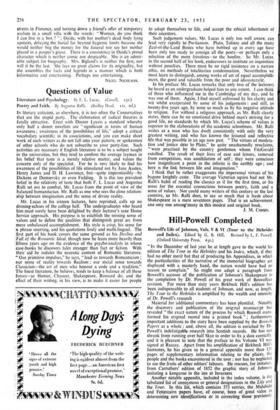Questions of Value
Literature and Psychology. By F. L. Lucas. (Cassell. ss.) Poetry and Faith. By Augustus Ralli. (Bodley Head. t is. 6d.) IN literary criticism, as elsewhere, it is too often the Conservatives that are the stupid party. The elaboration of radical theories is fatally attractive. Erect with Doctor Leavis a standard whereby only half a dozen novelists are " significant in terms of human awareness ; awareness of the possibilities of life," adopt a critical vocabulary scientific in its associations, and you can make short work of such writers as do not fall into your pattern, or spokesmen of other schools who do not subscribe to your party-line. Such activities are necessary if English literature is to be a subject taught in the universities, but they tend to confirm the average layman in his belief that taste is a merely relative matter, and values the concern only of the specialist. For he is very likely to find his awareness of the possibilities of life stimulated not by Jane Austen, Henry James and D. H. Lawrence, but—quite impermissibly—by Dickens or Dostoevsky or even Fielding. It is this too prevalent belief in the relativity of taste that both F. L. Lucas and Augustus Ralli set out to combat, Mr. Lucas from the point of view of the balanced humanitarian. Mr. Ralli as one who sees the close relation- ship between imagination and the sense of divine reality.
Mr. Lucas in his sixteen lectures, here reprinted, calls up no droning-echoes of the college hall. The undergraduates who heard him must surely have been delighted by their lecturer's sane Home Service approach. His purpose is to establish the missing sense of values and to define the qualities that distinguish great art from mere unbalanced accomplishment. His style is crisp, his sense for :a phrase unerring, and his quotations lively and multi-lingual. The first part of his book covers the same ground as his Decline and Fall of the Romantic Ideal, though now he leans more heavily than fifteen years ago on the evidence of the psycho-analysts in whose case-books he discovers talcs stranger than fact or fiction. With their aid he isolates the neurotic content of Romantic literature. " Our primitive impulses," he says, " lead us towards Romanticism ; our sense of reality towards Realism ; our social sense towards Classicism—the art of men who honour a code and a tradition." The finest literature, he believes, tends to keep a balance of all these forces—as Homer, Chaucer, Shakespeare, Ronsard do, and the effect of their writing, in his view, is to make it easier for people to adapt themselves to life, and accept the ethical inheritance of their ancestors.
Such judgement values, Mr. Lucas is only too well aware, can lead very rapidly to Puritanism. Plato, Tolstoy and all the many Zeal-of-the-Land Busies who have bobbed up in every age have been only too ready to consign all the poets—or perhaps only a selection of the more frivolous—to the bonfire. So Mr. Lucas, in the second half of his book, endeavours to institute an inquisition without penalties. There must be no rigid insistence on a narrow ethic, no methods of totalitarian condemnation. Nevertheless we must learn to distinguish, among works of art of equal accomplish- ment, the good and valuable from the poor and idiosyncratic. • In his preface Mr. Lucas remarks that only two of the lecturers he heard as an undergraduate helped him to any extent. I can think of three who influenced me in the Cambridge of my day, and lie was one of them. Again, I find myself enlivened by his clarity, and wit whilst exasperated by some of his judgements ; and still, as twenty-five years ago, by none so much as by his negative attitude to religion. For without a religious approach, as Mr. Ralli clearly states, there can be no emotional drive behind man's striving for a good life, no standards by which Mr. Lucas's scheme of values is superior to the elaborations of the academic schoolmen. Mr. Ralli writes as a man who has dwelt consistently with only the very greatest writing, and who has known the leisured and reflective life that was possible in an age now past. " The virtues of modera- tion and 'justice dear 'to Plato," he quite unashamedly proclaims, " were practised by the country gentlemen whom FitzGerald extolled. The result of their lives of ease and leisure, removed from competition, was annihilation of self ; they were conscious how insignificant a point in the infinite is the earthly ego ; and here is the link between life and imagination."
I think that he rather exaggerates the impersonal virtues of 'his bygone knightly caste. The average Victorian squire had not Mr. Ralli's habit of reading the classics as if for the first time, or his sense for the essential connections between poetry, faith and a sense of values. Nor could many writers of this century or the last contrive, as Mr. Ralli does, to say so much that is fresh about Shakespeare in a mere seventeen pages. That is an achievement, and only one amongrmany in this modest and original book.
J. M. COHBN.






































 Previous page
Previous page